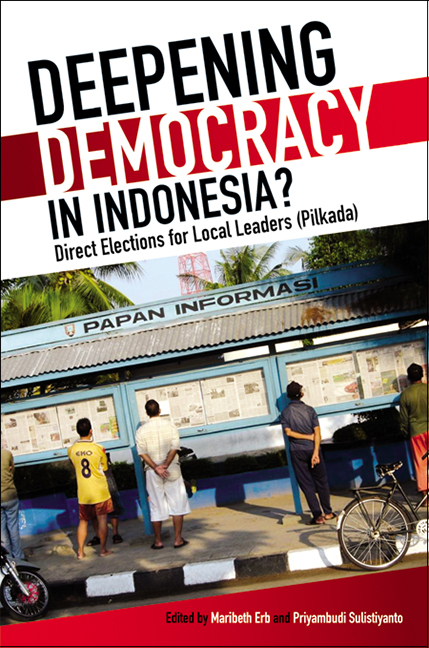Book contents
- Frontmatter
- Dedication
- Contents
- List of Tables
- List of Figures
- Contributors
- Acknowledgements
- Glossary
- 1 Indonesia and the Quest for “Democracy”
- 2 Pilkada Langsung: The First Step on the Long Road to a Dualistic Provincial and District Government
- Part I Political Parties, Politician Elites and the Voters
- 3 Political Parties in Pilkada: Some Problems for Democratic Consolidation
- 4 Batam's 2006 Mayoral Election: Weakened Political Parties and Intensified Power Struggle in Local Indonesia
- 5 The Rising Importance of Personal Networks in Indonesian Local Politics: An Analysis of District Government Head Elections in South Sulawesi in 2005
- 6 Pilkada, Money Politics and the Dangers of “Informal Governance” Practices
- 7 Electing District Heads in Indonesia: Democratic Deepening or Elite Entrenchment?
- 8 Gender and Reform in Indonesian Politics: The Case of a Javanese Woman Bupati
- 9 Pilkada in Bantul District: Incumbent, Populism and the Decline of Royal Power
- Part II Media and Campaigns: Comparing Local and National Elections
- Part III Conflict, Ethnicity, and Political Divisions
- Index
9 - Pilkada in Bantul District: Incumbent, Populism and the Decline of Royal Power
from Part I - Political Parties, Politician Elites and the Voters
Published online by Cambridge University Press: 21 October 2015
- Frontmatter
- Dedication
- Contents
- List of Tables
- List of Figures
- Contributors
- Acknowledgements
- Glossary
- 1 Indonesia and the Quest for “Democracy”
- 2 Pilkada Langsung: The First Step on the Long Road to a Dualistic Provincial and District Government
- Part I Political Parties, Politician Elites and the Voters
- 3 Political Parties in Pilkada: Some Problems for Democratic Consolidation
- 4 Batam's 2006 Mayoral Election: Weakened Political Parties and Intensified Power Struggle in Local Indonesia
- 5 The Rising Importance of Personal Networks in Indonesian Local Politics: An Analysis of District Government Head Elections in South Sulawesi in 2005
- 6 Pilkada, Money Politics and the Dangers of “Informal Governance” Practices
- 7 Electing District Heads in Indonesia: Democratic Deepening or Elite Entrenchment?
- 8 Gender and Reform in Indonesian Politics: The Case of a Javanese Woman Bupati
- 9 Pilkada in Bantul District: Incumbent, Populism and the Decline of Royal Power
- Part II Media and Campaigns: Comparing Local and National Elections
- Part III Conflict, Ethnicity, and Political Divisions
- Index
Summary
INTRODUCTION
The year 2005 saw an increase in local political activities throughout Indonesia with the regions embarking on pilkada (pemilihan kepala daerah langsung) (direct elections of district heads). Although there have been criticisms of pilkada, such as the absence of independent candidates, the limited logistics, the lack of political socialization, the inexperience of regional electoral commissions, and the confusion over legal frameworks, surprisingly pilkada went relatively smoothly with only a few regions experiencing political troubles and crises. By any measure, it can be argued that pilkada contributed significantly to local democracy in the regions (Amirudin and Bisri 2006; Prihatmoko 2005; Romli 2005).
There is no doubt that pilkada in the regions produced both different as well as similar experiences across Indonesia and it is important to locate these in the context of the recent studies of decentralization and local politics in post-Soeharto Indonesia (Aspinall and Fealy 2003; Erb, Sulistiyanto, and Faucher 2005; Hadiz 2004; Kingsbury and Aveling 2003; Sakai 2002). Decentralization policies implemented since 2001 are a part of a democratization process in Indonesia that has changed the nature of the centre–region relationship between Jakarta and the regions, and paved the way for the emergence of local governance. While the local government is now closer to the people, theoretically empowering people in the regions, decentralization has also been accompanied by an increase in corruption activities, and the rampant spread of “money politics”. Also, it has been pointed out by Hadiz (2004) that decentralization has not changed the “oligarchic” nature of Indonesian politics, since those who controlled and benefited from the political and economic resources during the Soeharto period have reorganized themselves and adjusted their roles at both national and local levels in a new democratic environment.
While accepting these views, I want to argue for a more locally grounded perspective for examining the dynamics of local politics. This will take into account various factors such as the importance of local leadership styles, local political networks, local cultural resources, and local historical knowledge, especially among the ordinary people. By suggesting this, it is important to avoid making generalizations about the emerging phenomena of pilkada in the regions. This requires recognizing pilkada as a part of the local political context where each election has its own features that differ from others.
- Type
- Chapter
- Information
- Deepening Democracy in Indonesia?Direct Elections for Local Leaders (Pilkada), pp. 190 - 208Publisher: ISEAS–Yusof Ishak InstitutePrint publication year: 2009

